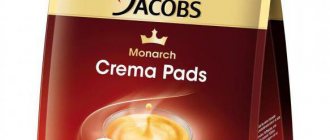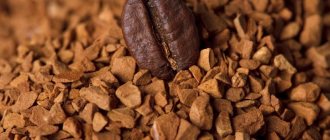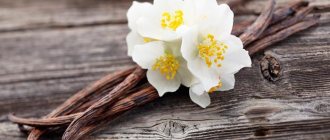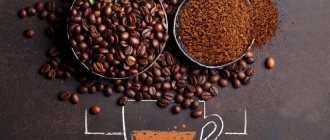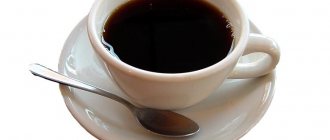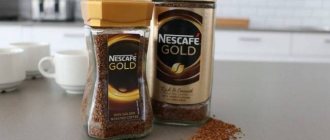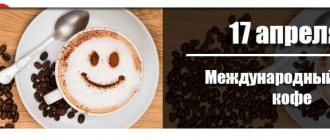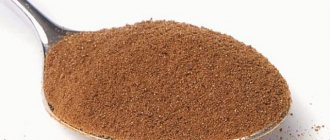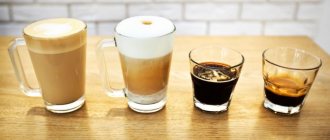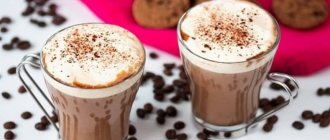Top 5 instant coffee by quality – according to control purchases of Roskontrol
Having familiarized yourself with the buyer's opinion, it would not hurt to study the verdicts of the independent expert commission of Roskontrol. According to them, a rating of the best freeze-dried coffee presented on the Russian market was compiled.
Jardin "Kenya Kilimanjaro"
Price – 324 rub. per 100 g
Tasty, safe, natural, without foreign inclusions, this coffee successfully passed the test of Roskontrol, without causing the slightest criticism from experts.
The net weight corresponds to that indicated on the packaging, no aflatoxin was found in the composition, or other harmful toxins.
The analysis confirmed that the product was made from natural Arabica coffee beans, as noted on the packaging.
Advantages and disadvantages
safety;
natural composition;
organoleptic qualities;
package.
were not identified by the examination.
Jacobs Monarch
Price – 230 rub. per 100 g
A real favorite of Russians, which has become popular due to its rich, impeccable taste and aroma without the slightest hint of acid and the optimal price-quality ratio. During the examination, no third-party components or harmful impurities were identified in the coffee.
Experts confirmed the natural composition of the product and its full compliance with current state standards. No weight deficiency was identified.
Advantages and disadvantages
organoleptic qualities;
natural composition of the product;
absence of harmful impurities;
high quality packaging.
the manufacturer did not indicate the botanical variety of coffee in the labeling of its own product.
Instant freeze-dried coffee
6 brands were presented for the study:
- Black card;
- Moscow coffee shop on shares;
- Maccoffee Gold;
- Jacobs Monarch;
- Moccona;
- Tchibo Exclusive.
Experts from the people gave the most votes to Jacobs Monarch coffee. Drinks from the Maccoffee Gold and Tchibo Exclusive brands also made it to the semi-finals.
Test center experts measured the percentage of moisture in coffee. If this figure is more than 6%, this means that the product may suddenly deteriorate and lose its presentation. During the test, all declared samples had a normal moisture percentage.
To determine the best instant coffee, the control purchase and its experts, in the finale of the TV show, examined the mass fraction of caffeine in coffee, which should not be lower than 2.3%. The opposite indicates a rather low quality of raw materials or a violation of the product’s production technology. All participants showed results within the normal range, but Maccoffee Gold coffee contained the most caffeine.
Every day
Instead of natural coffee beans, the manufacturer uses coffee-like powder, which passes off as natural coffee. And the low price should alert the buyer, because natural raw materials are much more expensive.
Questions are raised by a mark in the labeling indicating that the drink has been tested for compliance with GOST and is certified. This brand's products contain large amounts of caffeine.
Methods for producing instant coffee
The whole essence of making instant coffee comes down to the following technological processes:
- Roasting green coffee beans;
- Grinding roasted coffee;
- Treatment of ground coffee with hot water, or extraction, i.e. brewing coffee.
These stages of the technological process are similar to how coffee is prepared at home, only this happens on an industrial scale. Next, the resulting coffee extract is filtered, separated from the grounds, and dried. That is, the last stage of the technological process is drying, which determines the type of instant coffee obtained. Thus, it can be of the following types:
- powder _ This coffee is produced using spray dry technology, “spray drying”. The coffee extract is sprayed into a stream of very hot air and dries into a powder;
- granular _ This type of coffee is produced from powdered coffee, which is made by spray drying, adding another step to the technological process - aggregation, which, in essence, is the wetting of coffee powder to form granules. Such granules then, during storage of the finished product, can again disintegrate and turn into powder;
- freeze-dried . This coffee is produced using freeze dry technology, “freeze drying”. The coffee extract is frozen, then crushed into small crystals, and then dehydrated by sublimation in a vacuum. After the water evaporates, the dry extract retains its crystal form, acquiring a caramel color.
This manufacturing method best preserves the flavor and aromatic substances of the coffee extract, but due to the fact that this technology is the most energy- and labor-intensive, freeze-dried instant coffee is more expensive than powdered and granulated coffee.
Coffee test results
Not long ago, Roskontrol specialists conducted research on popular varieties of instant coffee.
The laboratory tested 7 samples: Black Card, Jacobs Monarch, Neskafe Gold, Tchibo, LeCafe, Ambassador, Milagro. Ambassador Platinum is a soluble and natural drink that has good organoleptic properties. The indicators comply with the requirements of GOST 32776-2014. Toxic elements are low in content. The taste is quite pronounced, with some acidity and a bitter aftertaste. The information on the label is accurate. No harmful impurities were found.
The popular bookmaker has launched a mobile application for Android, you can follow the link absolutely free and without registration.
Nescafe Gold is a drink made from natural ingredients. The cadmium content in the drink is within the permissible limit. The glucose and acid content meets the criteria of a genuine product.
Tchibo Gold Selection. Natural instant coffee with high caffeine content. No arsenic or mercury content was detected. Organoleptic indicators are normal, no harmful impurities were detected. The tested sample meets safety requirements for the content of toxic elements.
Roskontrol checked the quality of flour in stores, which one should you not buy?
Milagro Gold is one of the most popular instant coffee varieties, with its unique unique aroma and low moisture content. The overall rating for safety, naturalness and quality is 72. No harmful substances were identified in the sample.
LeCafe Gold. The verified indicators meet safety requirements for the content of toxic elements. The presence of lead, arsenic, cadmium and mercury is within acceptable limits. Physico-chemical indicators meet the requirements of the standard. No false information was found in the labeling. High caffeine content.
Jacobs Monarch is an instant drink with low caffeine content. Organoleptic properties are normal. Corresponds to the information on the packaging. Authenticity criteria confirm the natural composition of the product.
"Black Card" Gold. The overall score for all indicators is 59. Natural coffee that has good organoleptic properties. The content of lead and cadmium is within the permissible value. Contains quite a lot of moisture. Physico-chemical indicators meet the standard. The information on the label is reliable.
Beverage aroma evaluation
| Brand | Drink aroma |
| Jardin | Intensive. Roasted walnuts |
| Jacobs Monarch | The intensity is average. Charcoal-woody notes, dark chocolate |
| Paulig | Not intense, walnut, cocoa |
| Tchibo Exclusive | Medium intensity, woody notes, toasted hazelnuts |
| Dallmayr prodomo | Medium intensity, strong black tea, vegetable notes |
| "Live Coffee" | Intense, woody notes, rancid seeds |
| Melitta | Intense aroma, woody and nutty notes, dark chocolate |
What instant coffee should contain and what it shouldn't
Almost all types of coffee are made from two varieties - Arabica or Robusta, or at worst, a mixture of them. Instant coffee is no exception; another thing is that the raw materials used for its preparation are far from playing the first fiddle. Thus, the quality of the drink and, as a consequence, its price directly depend on the method of processing the coffee beans.
Currently, there are three types of products on store shelves: powdered, granulated and freeze-dried (frozen) coffee. The first option is the most affordable, the last is expensive, although regardless of this factor, all three types of coffee undergo a procedure for restoring organoleptic qualities, for which all kinds of chemistry are used.
See also:
9 Cheap, Elite Quality Coffees That Are Definitely Worth Buying
At the same time, the most aggressive composition can be observed in the so-called healthy decaffeinated coffee, since the latter is extracted from the beans through the use of special acids, often downright harmful and in some cases even dangerous.
The only “clean” option is organic coffee, which is made by brewing and drying an extract.
But there is also a serious drawback - the exorbitant price, which makes this product a rare guest in small groceries.
As for the products traditional for our stores, their composition is characterized by the following features:
- The volume of main products obtained from coffee beans should be at least 15-20%.
- The amount of caffeine in a regular soluble powder should not be less than 2%, while in freeze-dried products this volume already corresponds to 3%.
- Products may contain natural coffee substitutes, including grains, dry artificial cream and other additives.
This does not contradict current standards, provided that the inclusion of such ingredients is required on the packaging.
In addition, it is worth remembering that 100% freeze-dried coffee costs a lot of money, completely dissolving even in cold water in 3 minutes. Everything else is from the evil one and the dishonesty of the manufacturers, which we certainly cannot turn a blind eye to.
This is not coffee
It seems that it is not for nothing that the Italica brand sample contains so little caffeine - in terms of total glucose content, this product does not at all correspond to the name “coffee” according to GOST. Experts discovered the same violation when checking samples of “Jockey” and MacCoffee. This can only mean one thing: all three products contain a significant admixture of raw materials of other origin - in particular, cereal grains or chicory.
Meanwhile, according to the standard, coffee is a one-component product, which should not contain anything except the coffee beans themselves, processed in one way or another. But if the product contains grains or chicory, it cannot be called coffee - only a coffee drink. At the same time, it is impossible to find out what exactly caused the falsification - the lack of proper incoming control or the deliberate substitution of raw materials.
One way or another, for signs of counterfeit coffee, three brands - Jockey, Italica and Maccoffee - were blacklisted.
